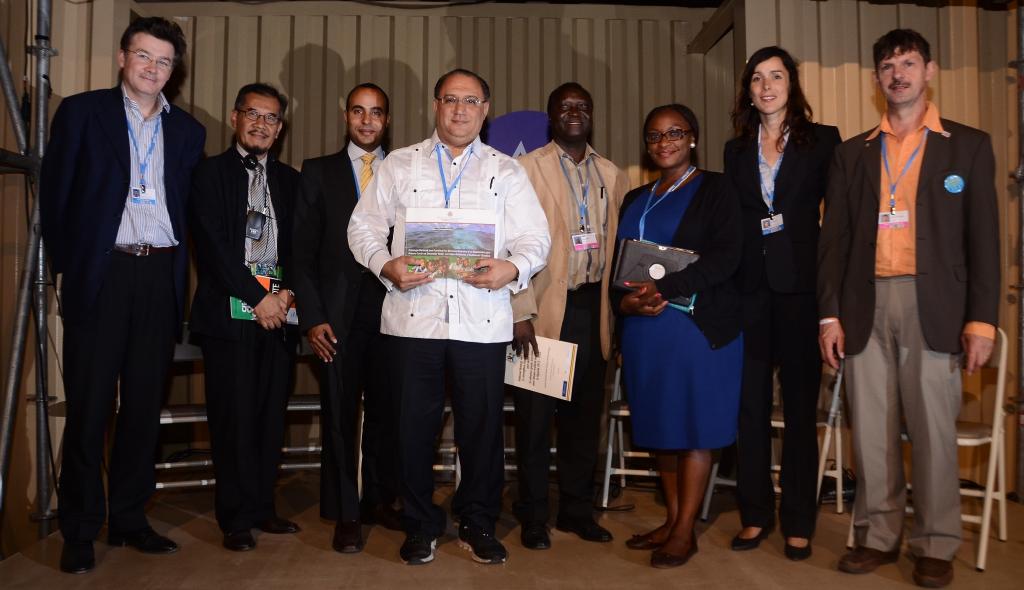UN CC:Learn Ambassadors Share their First Hand Experience on Climate Change Education and Training with the People of Peru
An Inspiring Evening Outside the Negotiation Halls
4 December 2014, Lima, Peru - While inside the ‘Pentagonito’ (the venue where currently the 20th Conference of the Parties to the UNFCCC is taking place) negotiators are discussing a new agreement for the period after 2020, the ‘Voices for Climate’ area provides an opportunity for the general public to learn about climate change and how it affects forests, mountains, oceans, cities and energy supply. Inside this imaginative space, Ambassadors for Climate Change Learning from four countries (Dominican Republic, Indonesia, Malawi and Uganda) engaged in a discussion with COP delegates and visitors from Lima on how to strengthen learning on climate change, from education for children to professional training for adults. The event was the first joint performance of the UN CC:Learn Ambassadors since their endorsement by the UN CC:Learn Steering Group in October 2014.

Mr. Daniel Maselli, Senior Policy Advisor at the Swiss Agency for Development and Corporation (SDC), who opened the event, highlighted the importance of knowledge and skills to address climate change, from the technical to the highest political level. He highlighted: “There are many existing resources and experiences we can learn from and that’s why SDC is pleased to support UN CC:Learn and it’s knowledge-sharing element.”
Mr. Angus Mackay, Head of the UN CC:Learn Secretariat and Manager of UNITAR's Climate Change Programme, pointed out: "Whenever we talk about climate change we think about funding, but we often forget that learning and knowledge-sharing are as important and can achieve major results with relatively limited resources.” In terms of UN CC:Learn he highlighted that “we have the opportunity to learn from experiences around the world, from Asia, Africa, Latin America, and this is the richness of this programme.”
UN CC:Learn is supporting countries in strengthening their human resource capacities through the development and implementation of national climate change learning strategies. What these strategies look like in practice was illustrated by the lively accounts of the Climate Change Learning Ambassadors.

Mr. Omar Ramirez (left), Executive Vice-President of the National Council for Climate Change and Clean Development Mechanism (CNCCMDL) of the Dominican Republic highlighted the transformational change that the climate change learning strategy has initiated in the country. He spoke about the crucial role of the education sector and announced that the Ministry of Education is investing 1 million USD from the national budget in climate change training for teachers in 2014-2016. Ms. Shamiso Najira (right), Chief Environmental Officer at the Environmental Affairs Department, Malawi added the experience of her country, where a poster on climate change and other teaching materials have been distributed to all primary schools in the country: “We are reaching out to an entire generation of young Malawians”, she said. Plans for next year include a climate change source book for secondary schools.

Mr. Doddy Sukadri (left), Low Carbon Development Advisor at the Secretariat of the National Council on Climate Change (DNPI), Indonesia talked about the political dimension of Indonesia’s climate change learning strategy which is important for achieving the country’s emission reduction targets and implementing Article 6 of the Convention. Mr. Chebet Maikut (right), Commissioner of the Climate Change Department in Uganda pointed to some strategic implementation actions in his country: “We are training climate change focal points in all key ministries so that they can take the implementation of our climate change learning strategy forward.” He also announced that Uganda will be investing 2 million USD in human resource development for environment and climate change, starting in 2015.
Ms. Amrei Horstbrink, Training Associate at the UN CC:Learn Secretariat/UNITAR and moderator of the event, thanked the Ambassadors for their inspiring inputs. She talked about the role the Ambassadors are playing not only at the global level, but equally at national and regional levels were they are sharing their technical knowledge and experience with new countries joining the UN CC:Learn family.
The accounts of the Learning Ambassadors stimulated many questions and statements from the public, including requests by countries hoping to join the UN CC:Learn partnership. Participants from Peru working in the education sector were also interested in accessing materials and sharing knowledge and experiences with the Ambassadors. The discussion emphasized in particular the role of traditional knowledge and how to reach out to those that are not part of the formal education system.
Related Links
UN CC:Learn is a partnership of more than 30 multilateral organizations supporting countries to design and implement systematic, recurrent and results-oriented climate change learning. At the global level, the partnership supports knowledge-sharing, promotes the development of common climate change learning materials, and coordinates learning interventions through a collaboration of UN agencies and other partners. At the national level, UN CC:Learn supports countries in developing and implementing national climate change learning strategies. Through its engagement at the national and global levels, UN CC:Learn contributes to the implementation of Article 6 of the UNFCCC on training, education and public awareness-raising, and the 2012-2020 Doha Work Programme. Funding for UN CC:Learn is provided by the Swiss Government and UN partners. The Secretariat for UN CC:Learn is hosted by the UN Institute for Training and Research (UNITAR).
Image 1: From left to right: Mr. Angus Mackay, UN CC:Learn Secretariat/UNITAR; Mr. Doddy Sukadri, National Council on Climate Change, Indonesia; Mr. Daniel Abreu and Mr. Omar Ramirez, National Council for Climate Change and CDM, Dominican Republic; Mr. Chebet Maikut, Climate Change Department, Uganda; Ms. Shamiso Najira, Environmental Affairs Department, Malawi; Ms. Amrei Horstbrink, UN CC:Learn Secretariat/UNITAR; Mr. Daniel Maselli, SDC.
Image 2: Mr. Omar Ramirez (left) Ms. Shamiso Najira (right).
Image 3: Mr. Doddy Sukadri (left) and Mr. Chebet Maikut (right).

